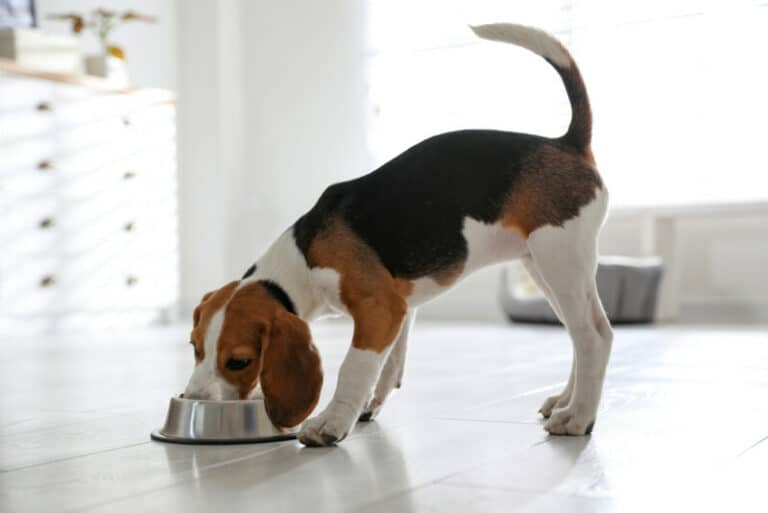Feeding your dog a nutritious and balanced diet is key to keeping them and their digestive system healthy. Low-quality food, among other things, can cause your dog to experience episodes of diarrhea, which really isn’t something you want to deal with.
These 7 superfoods help solidify your dog’s poop in a healthy way. They are easily digestible and contain loads of fiber to improve stool quality.
- Pumpkin.
- Banana.
- Carrots.
- Potatoes.
- Oatmeal.
- Rice.
- Yogurt.
While these foods won’t compensate for the lack of a proper diet, they will nicely complement an already existing meal plan and help your dog stay healthy and happy.
1. Pumpkin
First of all, we have pumpkin. It’s a super-healthy food option for dogs because of its high soluble fiber content. Dogs have little trouble digesting it, and it provides them with a host of important minerals and nutrients, such as Vitamin A, C, and E, and Iron and Potassium.
It’s one of the most popular alternative foods for dogs. It’s what many diet-conscious dog owners first turn to when their dog suffers from an episode of diarrhea.
Additionally, pumpkins have a healthy amount of prebiotics that will improve your dog’s gut health and their ability to properly digest their regular meals, which makes pumpkins a great complement to any diet.
Adding pumpkin to your dog’s diet is easy – simply add a few tablespoons of pumpkin powder to each meal. I recommend starting with 1 tablespoon and working your way up to 4. You can make it a regular, long-term part of your dog’s diet, as many pet owners do.
Know that canned pumpkin is better than fresh pumpkin, particularly when it comes to managing loose poop. Because the canned version has less water. It’s okay to use fresh pumpkins, too, though.
2. Banana
Next up, we have another fruit. And it’s one loved by both humans and dogs – the Banana.
Like pumpkins, bananas have a healthy amount of fiber and are easily digestible. Bananas offer a different composition of nutrients, namely Pottasium and Magnesium, so letting your dog have some from time to time can help keep their diet balanced.
Bananas are also low in calories, so they won’t cause your dog to gain weight. Their caloric content does consist largely of carbs and sugars, though, so they aren’t suitable as a primary ingredient in your dog’s diet.
Instead, give your dog banana slices as treats! Most dogs love it.
It’s safe for a medium-sized dog to eat up to half a banana per day. For smaller dogs, restrict intake to a few slices.
3. Carrot
The first vegetable on our list, the humble carrot is known for its great health benefits in humans, particularly for eye health. You’ll be glad to know that most of these benefits carry over when they’re fed to dogs, too.
Carrots are a low-calorie snack your dog will love. They’re high in fiber and will help solidify dog poop. Carrots stand out from the other items on this list in that they contain high concentrations of beta-carotene – a substance that improves vision, skin color, skin health, and immune function in dogs.
Carrots are safe for canine consumption as long as you cut them up into bite-sized pieces. I recommend using carrot slices as treats.
A good rule of thumb with treats is to not let them constitute more than 10% of your dog’s daily intake.

4. Potato
Potatoes are a great all-around food option for dogs. They contain a lot of fiber and starch. Starch is an easily digestible food source and fiber, as you already know by now, improves digestive function.
The only thing to note is that raw potatoes are toxic to dogs because they contain solanine. You must cook the potato to bring solanine levels down to where it’s safe for consumption.
Still, potatoes are only meant to be eaten by dogs every now and then. I don’t recommend feeding them to your dog daily, especially if their dog food already contains potato as an ingredient.
5. Oatmeal
If there’s one thing oatmeal’s popular for, it’s the digestive benefits. There’s not much to say about oatmeal other than it’s a great food option for dogs and is, therefore, already being added to commercial dog food.
Oatmeal is the perfect carbohydrate source for dogs allergic to wheat and grain. Now, dogs don’t need a lot of carbs; their primary energy source is protein.
You can give your dog a few tablespoons of oatmeal daily.
Just remember to give it to them raw or made in water, as the lactose in milk will just worsen existing digestive problems. Whole-grain oatmeal is preferable to quick oats.
6. Rice
Like oatmeal, rice is a great source of carbs for dogs. Roughly speaking, both are equally as healthy. Some vets will swear by oatmeal, whereas others will prefer rice. In our opinion, both are equally as good – you can simply go with whichever you or your dog prefer.
Out of all the different types of rice, boiled plain white rice is the best. It will soothe your dog’s GI tract and give its digestive system some much-needed relief.
As with the other entries, rice is not a substitute for, but rather a complement to, dog food.
7. Yogurt
Greek yogurt, in particular, will help solidify dog poop by aiding the digestive system. Yogurt is rich in probiotics or “good bacteria.” Unlike the other items on this list, yogurt is loaded with protein, which is a nice plus.
Now, yogurt is safe for consumption but contains lactose, which means lactose-intolerant dogs won’t have the best time. If your dog doesn’t react well to lactose, maybe skip out on this one.
I recommend greek yogurt because it has minimal lactose but retains its probiotic goodness.

